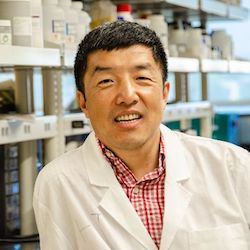Graduate Student Seminar
February 07, 2025
10:00 a.m. ET
McConomy Auditorium, First Floor Cohon University Center
February 07, 2025
10:00 a.m. ET
McConomy Auditorium, First Floor Cohon University Center
Solid oxide cells (SOCs) are promising high temperature electrochemical conversion device for the next generation efficient hydrogen production and energy storage. They have been actively studied because of their high energy conversion efficiencies and prospective applications as electrochemical reactors. In this talk, I will introduce SOC, its working principal, advantages, materials being used, and applications. I will also present WVU’s research in this area, with the focus on our recent progress on protonic ceramic electrochemical cells (PCECs) air electrode and electrolyte. With all the promising potentials, the existing air electrodes are far from satisfying the requirements of practical applications, a series of issues, including the lack of active and durable electrodes, greatly limit the commercialization. To date, the systematic development of triple conducting catalysts remains abstruse because of the challenges of characterizing protonic behavior. A quantitative properties assessment and prediction on protonic properties of perovskite are still not available. Starting with a computational fluid dynamic modeling on the protonic ceramic electrochemical cells (PCECs) air electrode, we focused on the materials design of air electrode materials by employing model guidance, operating durability optimization by electrode structure engineering, as well as the air electrode surface tailoring to overcome the most rate-limiting step. Thus, the electrochemical performance and durability of PCEC care comprehensively improved. The fabrication methods, characterization techniques with electrochemical performance are presented. Further work plans and implications are proposed regarding optimizing the structure of materials, preparation technology, and better understanding the role of these triple conductors. This research is expected to provide an in-depth understanding and offer avenues in the rational design of PCEC with long operational life and high energy/power density in the near future.

Liu received his Ph.D. on Materials Science from University of Science and Technology Beijing in 1999, and he subsequently came to West Virginia University as a postdoc. Currently, he is the Associate Dean of Research and Statler Endowed Chair Professor of Engineering in Statler College of Engineering and Mineral Resources at West Virginia University. Dr, Liu’s has developed an international recognized research program on materials for next generation energy conversion and storage, with the focus on high temperature materials such as solid oxide electrochemical cells & high temperature Ni-Superalloys. Dr. Liu has received numerous awards, including one R&D 100 Award (2011) for his development of SOFC interconnect coating, TMS Early Career Faculty Fellow Award (2010), TMS Brimacombe Medal (2016), State of West Virginia Innovator of the Year (2013), WVU CEMR Researcher of the Year (2015, 2011), Outstanding Researcher Awards (2015, 2011, 2009, 2008), and several others. He is the Fellow of ASM International and American Ceramics Society. In 2023, Dr. Liu received the Hydrogen Production Technology Award from U.S. Department of Energy in recognition of outstanding contributions to developing high-performing, efficient, and durable intermediate-temperature proton conducting solid oxide electrolysis cells.
February 13 2026
10:00 AM ET
Materials Science and Engineering
Interfacial Fracture in Soft Polymer Networks: Revisiting Gent's Picture, presented by Gabriel Sanoja Lopez, University of Texas, Austin
CUC McConomy Auditorium
February 20 2026
10:00 AM ET
Materials Science and Engineering
High-Fidelity Atomistic Simulations of Chemistry-Microstructure Interactions in Metals, presented by Rodrigo Freitas, Massachusetts Institute of Technology
CUC McConomy Auditorium
February 25 2026
2:00 PM ET
Faculty Insights with Mario Berges
Please join us for CMU Engineering's virtual program, “Faculty Insights: A 20 Minute Briefing.” In this series, faculty will share insights into their research, its impact, and provide perspective for the future of the field.
Virtual, link provided to registrants
February 27 2026
10:00 AM ET
Materials Science and Engineering
presented by Tim Weihs, Johns Hopkins university
CUC McConomy Auditorium
March 13 2026
10:00 AM ET
Materials Science and Engineering
presented by Rachel Goldman, University of Michigan
CUC McConomy Auditorium
March 20 2026
10:00 AM ET
Materials Science and Engineering
Accelerating Battery Materials Discovery with AI- and Physics-Powered Molecular Universe Platform, presented by Yumin Zhang, SES AI
CUC McConomy Auditorium